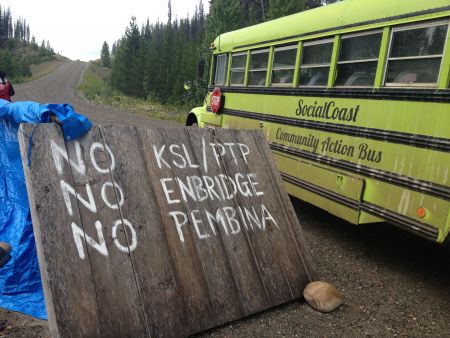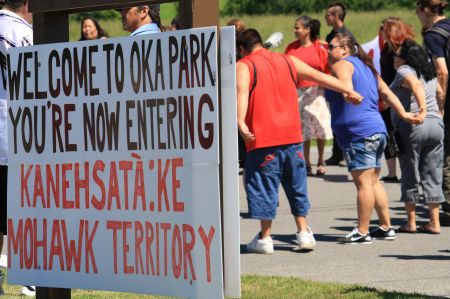Toronto police shot an 18-year-old youth nine times, killing him as he stood in the exit door of a streetcar. Sammy Yatim was wielding a three-inch knife when he was brutally murdered. A man who witnessed the events said the youth did not deserve to die. Hundreds of people participated in a protest against the police following the murder, and future vigils are planned.
SWN Resources announced it is halting seismic testing work in New Brunswick until September, following negotiations between various parties. The company has been dogged for weeks by protests and the presence of a Miq’maq-led sacred fire encampment. Charges against 25 of the 35 people arrested in the protests have been dropped.
The Council of Yukon First Nations has voted to keep the territory “frack free.” At its annual general assembly, representatives unanimously passed a resolution calling on the Yukon government to ban hydraulic fracturing on traditional territories. “This is a game-changer," said Don Roberts, who chairs Yukoners Concerned about Oil and Gas Development. "The First Nations are there to protect the land, protect the environment.”
The first public memorial to drug users was unveiled in Toronto. The monument, located in South Riverdale, honours 79 people who have died because of drug overdoses, hepatitis C, HIV, violence and poverty. Organizers said more names will be added to the monument, which seeks to raise awareness around the stigma faced by drug users and the ongoing violence of the War on Drugs.
Over 100 people attended a rally in Oka Park and slowed traffic on the nearby highway, on Kanehsatà:ke territory, to mark the 23rd anniversary of the Oka Crisis and to denounce work carried out by oil company Enbridge on traditional Mohawk territory without having consulted the community. The work is part of Enbridge’s contested plan to reverse its Line 9 pipeline, bringing tar sands bitumen to eastern Canada.
The Unis'tot'en held their fourth annual Action Camp. Some 200 people travelled to unceded Wet'suwet'en territory to participate in the camp, helping to build more structures on the land. The camp is built directly in the path of proposed natural gas pipelines which the Unis'tot'en have not approved for passage.
Opponents of plans to pipe tar sands bitumen from Alberta to the east coast of both Canada and the United States celebrated a cautious victory. Portland-Montreal Pipelines, which operates a pipeline that runs oil from Portland, Maine to Montreal, withdrew its application for a pumping station in Dunham, Quebec. The station was essential to plans to reverse the flow of the pipeline, to send oil from Montreal to Portland. The company is saying that it may reapply in the future.
A controversial proposal for an open pit gold mine in BC went up for review by the Canadian Environmental Assessment Agency for a second time. Taseko’s New Prosperity mine was first rejected in 2010 over concerns that it would drain Fish Lake to form a tailings pond. The new proposal would move the tailings pond. But the Tsilhqot'in National Government, for whom Fish Lake is sacred and who fought hard to block the first approval, has vowed to continue opposition over concerns about the environmental impact of the project.
The Ontario Coalition Against Poverty took to the streets in support of tenants across Toronto, demanding that the city bring back the Community Start-Up and Maintenance Benefit (CSUMB) for tenants who need financial support for housing. The mass application clinic for the current Housing Stabilization Fund (HSF), which is what replaced CSUMB, resulted in over 100 applications to the city for funds to prevent tenants from being evicted, to buy new furniture and to aid in improving housing conditions.
Industry Canada has paid out $22.1 billion in corporate welfare since 1961, including $8.8 billion in non-refundable grants, according to a new report by the Fraser Institute. According to the study, this is just a fraction of what is paid out by the government as a whole.
Guatemalans attempting to sue a Canadian mining company in Canadian courts over alleged human rights abuses scored a victory when a judge ruled that their lawsuits can go ahead. It is the first time that a case against a Canadian company over actions of one of its international subsidiaries—in this case, HudBay Minerals Inc.—has been allowed to go forward.
In Florida, George Zimmerman was found not guilty of all charges related to his killing of Trayvon Martin. The controversial decision by the jury led to protests in memory of Martin and against what is seen as a double judicial standard for African-Americans, especially young black men, across the US and Canada. El Jones, Halifax’s poet laureate, wrote about why the verdict is important in Canada.
At least 72 people were shot dead in one day by Egyptian state forces, as protests continue to rock the country. Former President Mohamed Morsi was removed by the army earlier in the month.
B. Manning, a former US Army Private accused of numerous offences relating to his transmission of US state secrets to WikiLeaks, was convicted on 20 charges by a military tribunal judge. Much was made of the fact that Manning was not convicted of the most serious charge, that of aiding the enemy. Regardless, his sentence could run 136 years.
Haligonians mourned the passing of Burnley "Rocky" Jones, who was a prominent African-Canadian activist for nearly 50 years. He was 71.




